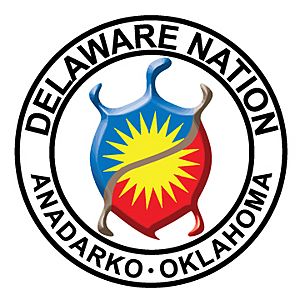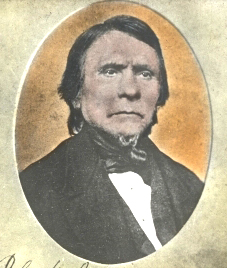Delaware Nation facts for kids
| Èhëliwsikakw Lënapeyok | |
|---|---|
 |
|
| Total population | |
| 2,081 (2021) | |
| Regions with significant populations | |
| Languages | |
| English, Delaware (Unami, Munsee) | |
| Religion | |
| Christianity, Native American Church, traditional tribal religion | |
| Related ethnic groups | |
| other Lenape and Algonquian peoples |
The Delaware Nation (Delaware: Èhëliwsikakw Lënapeyok) is a group of Delaware Indians based in Anadarko, Oklahoma. They are one of three federally recognized tribes of Delaware Indians in the United States. The other two are the Delaware Tribe of Indians in Bartlesville, Oklahoma, and the Stockbridge–Munsee Community in Wisconsin. There are also two Lenape First Nations in Ontario, Canada.
The Delaware Nation was once known as the Delaware Tribe of Western Oklahoma. People sometimes called them the Absentee or Western Delaware.
Contents
About the Delaware Nation
Language and Clans
The Delaware people historically spoke the Delaware language, also called Lenape. This language has two main forms: Munsee and Unami. These are closely related languages from the Eastern Algonquian family, which is part of the larger Algonquian language family.
Long ago, the Lenape people were divided into three main groups, which later became their clans. These were the Monsi (Wolf), the Unami (Turtle), and the Unilactigo (Turkey). Today, these clans are known as the Tùkwsit (Wolf Clan), Pùkuwànko (Turtle Clan), and Pële (Turkey Clan). The Delaware Nation is part of the Pùkuwànko, or Turtle Clan.
Economic Life

The Delaware Nation works to create economic opportunities for its members. In 2010, their activities added about $5 million to the economy each year. They operate two casinos in Oklahoma: Gold River Bingo and Casino, located north of Anadarko, and Casino Oklahoma, which opened in Hinton in 2012.
A Look at Their History
Early Treaties
The Delaware were the very first Native American nation to sign a treaty with the new government of the United States. This important agreement, known as the Treaty of Fort Pitt, was signed on September 17, 1778.
Moving to Oklahoma
In 1867, the Delaware people bought land from the Cherokee Nation to establish their homes in Oklahoma. They paid a total of $438,000 for this land. There was a legal disagreement later about whether this sale also gave the Delaware people full citizenship rights within the Cherokee Nation. In 1867, courts decided that the Delaware had only bought the right to use the land for their lifetimes.
Changes in Land Ownership
The Curtis Act of 1898 was a United States law that aimed to break up tribal governments and divide tribal lands among individual members. The Lenape people fought against this law in court but were not successful. In 1907, their lands were divided into 160-acre plots for individual tribal members. Any land that was left over after this division was then sold to people who were not Native American.
Becoming a Recognized Nation
The Delaware Nation became officially recognized by the United States federal government on July 5, 1958. At that time, they were called the "Delaware Tribe of Western Oklahoma." In 1972, they approved their current constitution, which is like their rulebook. In November 1999, the tribe officially changed its name to the Delaware Nation.
In September 2000, the Delaware Nation of Oklahoma received 11.5 acres of land in Thornbury Township, Pennsylvania. This land was important to them because it was part of their ancestral territory.
In 2004, the Delaware Nation of Oklahoma tried to get back land in Pennsylvania that they had lost in the 1800s. This was connected to an old agreement from 1737 called the Walking Purchase, which was a very controversial land deal. The court decided that it could not rule on whether the original taking of the land was fair, especially since it happened before certain laws protecting Native American lands were passed. The court stated that the Delaware's original rights to the land were ended in 1737.
Notable Western Delaware
- Black Beaver (1806–1880), a Delaware leader, scout, and rancher.
- Holly Wilson (born 1968), a Delaware artist who works with many different types of art.
See also
 In Spanish: Nación delaware para niños
In Spanish: Nación delaware para niños
 | Janet Taylor Pickett |
 | Synthia Saint James |
 | Howardena Pindell |
 | Faith Ringgold |

